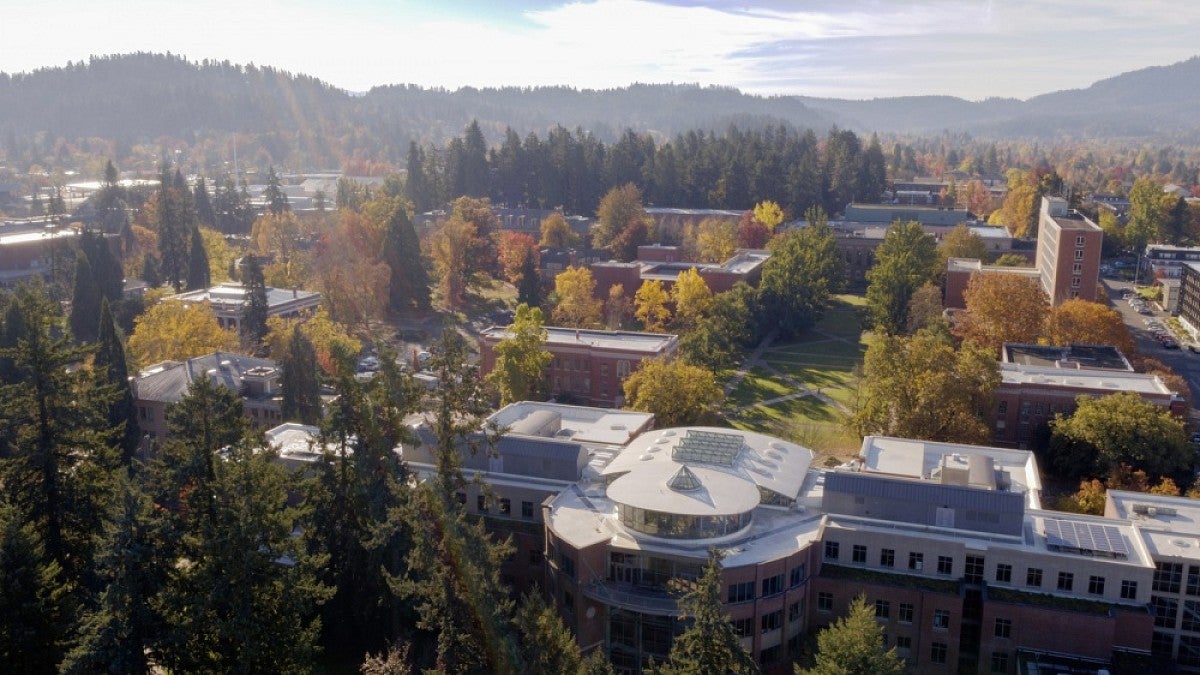In recognition of its strong commitment to economic engagement, the Association of Public and Land-grant Universities today designated the University of Oregon as an Innovation and Economic Prosperity University.
The national designation recognizes public research universities that collaborate with public and private sector partners in their states and regions to support economic development through activities that include innovation and entrepreneurship, technology transfer, talent and workforce development, and community development.
The designation is a recognition of the UO's commitment to building a stronger future for its region. It highlights how the university is working hand in hand with public and private sector partners to spark innovation, foster entrepreneurship, develop a skilled workforce and strengthen communities.

“The state of Oregon is a place where innovation thrives, and at the UO we are proud of our work and contributions,” President Karl Scholz said. “As an AAU and R1 research university, we are home to nationally distinctive research centers like the Phil and Penny Knight Campus for Accelerating Scientific Impact, the Institute for Neuroscience, the Oregon Humanities Center, and the Ballmer Institute for Children’s Behavioral Health.
“Our faculty advance research that shapes public policy and industry practice. Our students prepare for meaningful careers through internships, research labs, and real-world learning. And through these efforts, we serve not just the southern Willamette Valley, but Oregon, the nation and the world.”
This commitment also is reflected in the university’s strategic plan, which identifies accelerating innovation and scientific impact as a signature area of scholarship. Through initiatives like the Phil and Penny Knight Campus for Accelerating Scientific Impact and Launch Oregon, the UO is working to translate breakthrough discoveries into tangible benefits for society.
By investing in applied sciences, strengthening partnerships with industry and expanding pathways for entrepreneurship, the university is positioning itself as a driver of economic prosperity for Oregon and beyond.
"Universities are powerful engines for economic growth," said Waded Cruzado, president of the Association of Public and Land-grant Universities. "From cultivating talent and research breakthroughs to fostering new businesses and enriching communities, public universities play an indispensable role in economic advancement. We are thrilled to recognize the University of Oregon for its dedication to collaborating with its community to propel regional economic development."
The UO earned the designation after a rigorous, independent review process, which involved a thorough self-assessment of its economic engagement initiatives, enriched by insights from external stakeholders.
The association's Commission on Economic and Community Engagement, a national leader in the field, oversees that process, ensuring universities effectively plan, assess and communicate their impact on economic development. The UO is now one of more than 90 higher education institutions designated as an Innovation and Economic Prosperity University.
“The IEP designation recognizes UO’s strengths and accomplishments while also providing a roadmap for economic growth through a growth and improvement plan,” said Tina Guldberg, assistant vice president for economic development and strategic relations and co-lead of the core team that developed the application.
"Our focus is not on quick wins, but on implementing a strategic, long-term process to cultivate stronger, more impactful partnerships,” Guldberg said. “This is how the UO actively contributes to the sustained economic growth and social fabric of the southern Willamette Valley."
The designation demonstrates the UO's ongoing commitment to making a tangible difference in the lives of people and the prosperity of its region. It signifies the institution’s proactive approach to economic engagement, ensuring that the university's resources and expertise are directly applied to societal and economic challenges.
The association’s Innovation and Economic Prosperity program helps higher education institutions better understand, measure, articulate and enhance their contributions to economic and community development. It provides national recognition to universities that have demonstrated a substantive, sustainable and institution-wide commitment to and strategy for regional economic engagement, growth and opportunity.
The program emphasizes continuous improvement, with designated universities actively sharing best practices and collaborating within a national community of practice to maximize their economic and societal impact.


